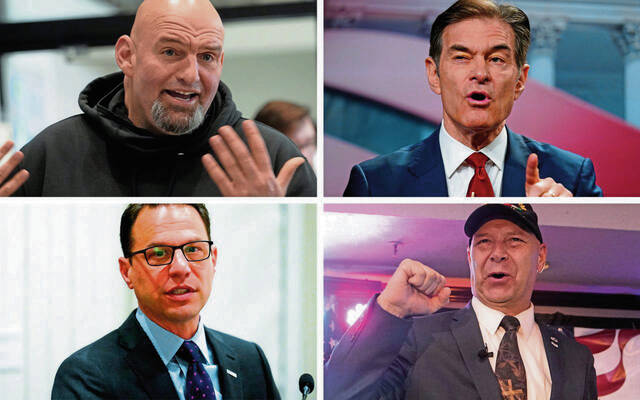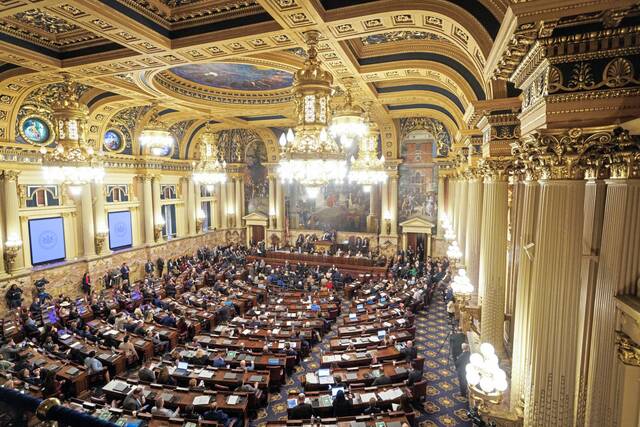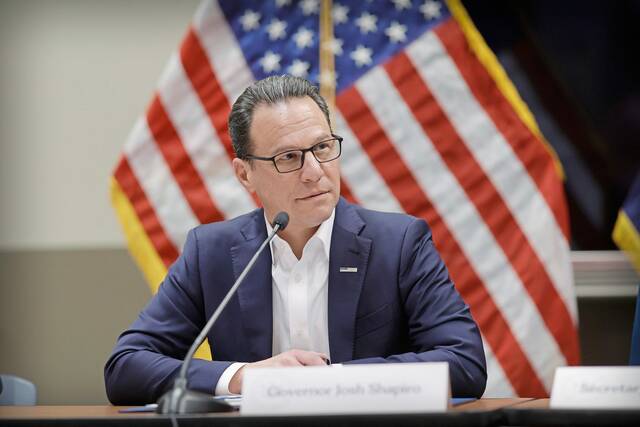Democratic U.S. Senate candidate John Fetterman has repeatedly taken to social media to mock his Republican rival, Dr. Mehmet Oz, during this year’s campaign — using celebrity cameo videos to call out Oz for moving from New Jersey to run, memes to criticize his vast wealth and even Oz’s own social media posts against him.
After Oz griped about the inflated price of vegetables and dips to make crudite in a recent post, Fetterman responded by tweeting, “In PA, we call this a veggie tray.”
Oz has responded with his own memes and attacked Fetterman on social media over his family’s wealth.
“I purchased my houses with MY money,” Oz tweeted in response to criticism that he owns 10. “You lived off your parents until you were almost 50. Regular people don’t mooch off their parents when they’re 50. Get off the couch John!”
In Pennsylvania’s gubernatorial race, Democratic candidate Josh Shapiro has used social media to criticize his Republican opponent, Doug Mastriano, for advertising on the far-right Gab — a platform designed as an alternative to Twitter — that authorities said accused Tree of Life shooter Robert Bowers used to make antisemitic rants before going into the Pittsburgh synagogue.
Mastriano, who removed his Gab account, took to Twitter to share a photoshopped image without explanation of Shapiro as a small child measuring himself to ride a roller coaster.
Pennsylvania’s political social media atmosphere has been odd, chaotic and sometimes funny. But it’s debatable how much of an impact all the social media posts are having on the races, according to political experts.
What is social media good for?
Chris Borick, political science professor at Muhlenberg College in Allentown, said social media has become a much larger part of campaigns in recent years. He said voter demographics have driven that, with many younger voters getting their news through social platforms.
“It is still a much less traditional role than television ads, but in terms of sense of campaigns, social media has become a major part,” Borick said.
Campaigns engage multiple platforms such as Facebook, Instagram, TikTok and Twitter, he said.
Borick said he believes Fetterman has embraced social media because it fits well with the personal brand he has built.
“He wants to be seen as a new breed of politician,” Borick said.
Related:
• Doug Mastriano’s Gab page removed, candidate responds to criticism of social media platform• Pittsburgh Jewish, Black leaders call out Doug Mastriano for ties to Gab social platform
• Fetterman harnesses power of social media in Senate campaign
J.J. Abbott, a communication consultant who has worked on Democratic campaigns in Pennsylvania, said Fetterman’s strategy might not directly lead to votes, but his memes and trolling on social media fires up his supporters.
For a politician, keeping your base energized can help build a team of campaign volunteers to knock on doors and boost campaign fundraising, he said.
Fetterman’s campaign announced Aug. 5 that it has surpassed 1 million individual campaign contributions. According to federal campaign filings, Fetterman raised $11 million between April and June, compared to Oz who brought in $3.8 million, including a $2.2 million loan from his personal finances.
Can social media backfire?
Politicians’ social media activity can draw negative attention.
In July, Mastriano was criticized for his attempts to advertise on the platform Gab. He paid Gab $5,000 in consultation fees, and the Huffington Post reported that new accounts on Gab were automatically following Mastriano’s account following the payment.
Shapiro ran an extensive social media campaign on Facebook and Twitter calling out Mastriano for the move, and Shapiro allies in Pittsburgh’s Jewish and Black communities condemned Mastriano on social media. Numerous news media outlets picked up on the story, and the controversy became a topic of more traditional TV campaign ads.
After the controversy, Mastriano’s Gab profile was removed, and he attempted to distance himself from the platform and its controversial Christian nationalist founder, Andrew Torba.
Last week, Fetterman used one of Oz’s past social media posts against him, skewering Oz for a video he made in April where he was shopping for “crudite” (chopped or sliced vegetables usually served with a dip). Oz misnamed the grocer where he was shopping, Berks-county based Redner’s, and used the term crudite multiple times, prompting some to label him as out of touch with average Pennsylvanians.
In response, Oz took to social media to try to brand Fetterman as a radical and a socialist. Oz used a well-known meme of U.S. Sen. Bernie Sanders, but replaced Sanders’ head with Fetterman’s to criticize Fetterman’s wealthy upbringing.
Samuel Chen, an Allentown-based political strategist who worked with former Republican lawmaker Charlie Dent and U.S. Sen. Pat Toomey, R-Lehigh Valley, said Oz hasn’t earned many headlines for his social media posts, and each one of them is usually swarmed with replies from Fetterman supporters.
“As far as the social media war, I think Fetterman is winning, and I don’t think it’s a close margin … (even though) Oz does have a lot of strong points against Fetterman,” Chen said.
He said Oz probably would be more effective sticking to his own brand, rather than trying to model his social media activity after Fetterman. Oz has a large social media following, but that was built up through his daytime television show. Chen said Oz’s charisma shines on TV, but not as much through memes and social media.
On Facebook, Mastriano might have an advantage.
Social media researcher Erin Gallagher said scores of local, Pennsylvania Facebook groups were created in 2020 to protest covid lockdowns.
In a blog post, Gallagher said many of the groups were administered from the same account as Mastriano’s main Facebook account, while others were organically created. There are more than 40 groups, and their combined membership totals over 40,000 members.
Gallagher said these groups have helped grow Mastriano’s Facebook audience exponentially.
Chen said Republicans can be effective in Pennsylvania even if social media isn’t a big part of their campaigns. Chen noted how Toomey won elections in 2010 and 2016 through mostly holding in-person events and running op-eds explaining policy in local newspapers, as well as buying a lot of TV ads.
TV is still king
Jacob Rubashkin, of the nonpartisan political analysis site Inside Elections, said successful campaigns aren’t all about social media.
He said a small portion of Pennsylvania’s electorate is following campaigns closely on social media and that TV ads are still the most important to campaigns.
Fetterman, Oz and Shapiro are all on the airwaves. Fetterman had a head start and is outspending Oz, while Shapiro is dominating TV ads compared to Mastriano.
Ultimately, the TV world might be where observers might want to watch the campaigns more closely. Rubashkin said social media is just a small slice of a successful statewide campaign.
“TV is still king when it comes to gaining votes in a Senate race,” he said. “Elections aren’t won and lost on Twitter.”








